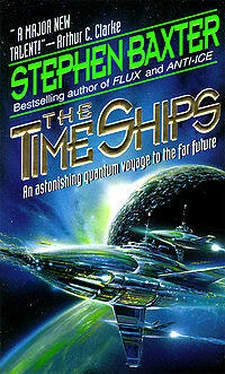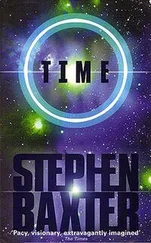Captain Bond nodded. “The rapid victory in the West enabled the Germans to turn their attentions to the Russians in the East. Then, by 1925—”
“By 1925,” said Filby, “the blessed Germans had established their dreamed — of Mitteleuropa.”
He and Bond sketched the situation for me. Mitteleuropa: Axis Europe, a single market stretching from the Atlantic coast to beyond the Urals. By 1925 the Kaiser’s control extended from the Atlantic to the Baltic, through Russian Poland as far as the Crimea. France had become a weakened rump, shorn of much of its resources. Luxemburg was turned, by force, into a German federal state. Belgium and Holland were compelled to put their ports at German disposal. The mines of France, Belgium and Rumania were exploited to fuel further expansion of the Reich, to the East, and the Slavs were pushed back, and millions of non-Russians were “freed” from Moscow’s dominance…
And so on, in all its meaningless detail.
“Then, in 1926,” said Bond, “the Allies — Britain with her Empire, and America — opened up the Front in the West again. It has been the Invasion of Europe: the greatest transportation of troops and material across water, and through the air, ever seen.
“At first it went well. The populations of France and Belgium rose up, and the Germans were thrown back—”
“But not far,” Filby said. “Soon it was 1915 all over again, with two immense armies bogged down in the mud of France and Belgium.”
So the Siege had begun. But now, the resources available to make War were so much greater: the life-blood of the British Empire and the American continent on the one hand, and of Mitteleuropa on the other, was all poured into that awful sink of War.
And then came the War on Civilians, waged in earnest: the aerial torpedoes, the gassing…
“ ’The wars of peoples will be more terrible than those of kings,’ ” Moses quoted grimly.
“But the people, Filby — what of the people!”
His voice, obscured by the mask, was at once familiar, yet removed from me. “There have been popular protests — especially in the late Twenties, I remember. But then they passed Order 1305, which made strikes and lockouts and the rest of it illegal. And that was the end of that! Since then — well, we’ve all simply got on with things, I suppose.”
I became aware that the walls of the tunnel had receded from the window, as if the tunnel were opening out. We seemed to be entering a large, underground chamber.
Bond and Oldfield unbuttoned their masks, with every expression of relief; Filby, too, released his straps, and when his poor old head came free of its moist prison, I could see white marks in his chin where the seal of the mask had dug into him. “ That’s better,” he said.
“We’re safe now?”
“Should be,” he said. “Safe as anywhere!”
I unbuttoned my mask and pulled it free; Moses shed his quickly, then helped the Morlock. When Nebogipfel’s little face was exposed, Oldfield, Bond and Filby all stared quite openly — I could not blame them! — until Moses helped him restore his cap and goggles to their appointed sites.
“Where are we?” I asked Filby.
“Don’t you recognize it?” Filby waved his hand at the darkness beyond the window.
“It’s Hammersmith, old man. We’ve just crossed the river.” Hilary Bond explained to me, “It is the Hammersmith Gate. We have reached the Dome of London.”
The London Dome!
Nothing in my own time had prepared me for this stupendous feat of construction. Picture it: a great pie-dish of concrete and steel almost two miles across, stretching across the city from Hammersmith to Stepney, and from Islington to Clapham… The streets were broken everywhere by pillars, struts and buttresses which thrust down into the London clay, dominating and confining the populace like the legs of a crowd of giants.
The train moved on, beyond Hammersmith and Fulham, and deeper into the Dome. As my eyes adjusted to the gloom, I began to see how the street-lights traced out an image of a London I could still recognize: “Here is Kensington High Street, beyond this fence! And is that Holland Park?” — and so forth. But for all the familiar landmarks and street names, this was a new London: a London of permanent night, a city which could never enjoy the glow of the June sky outside — but a London which had accepted all this as the price for survival, Filby told me; for bombs and torpedoes would roll off that massive Roof, or burst in the air harmlessly, leaving Cobbett’s “Great Wen” unmarked beneath.
Everywhere, Filby said, the cities of men — which had once blazed with light, turning the night-side of our turning world into a glowing jewel — had been covered by such brooding, obscuring Shells; now, men hardly moved between the great Dome-cities, preferring to cower in their man-made Darkness.
Our new train line appeared to have been slashed through the old pattern of streets. The roads we passed over were quite crowded, but with people on foot or on bicycles; I saw no carriages, drawn either by horse or by motor, as I had expected. There were even rickshaws! — light carriages, pulled by sweating, scrawny Cockneys, squirming around the obstacles posed by the Dome’s pillars.
Watching the crowds from the window of my slowing train, I caught a sense, despite the general bustle and busy-ness, of despondency, downheartedness, disillusion. I saw down-turned heads, slumped shoulders, lined, weary faces; there was a certain doggedness, it seemed to me, as people went about their lives; but there seemed to me — and it was not surprising — little joy.
It was striking that there were no children, anywhere to be seen. Bond told me that the schools were mostly underground now, for greater protection against the possibility of bombs, while the parents worked in the munitions factories, or in the huge aerodromes which had sprung up around London, at Balham, Hackney and Wembley. Well, perhaps that was a safer arrangement — but what a bleak place the city was without the laughter of running children! — as even I, a contented bachelor, was prepared to concede. And what kind of preparation for life were those poor subterranean mites receiving?
Again, I thought, my travels had landed me in a world of rayless obscurity — a world a Morlock would have enjoyed. But the people who had built this great edifice were no Morlocks: they were my own species, cowed by War into relinquishing the Light which was their birthright! A deep and abiding depression settled over me, a mood which was to linger for much of my stay in 1938.
Here and there, I saw rather more direct evidence of the horror of War. In Kensington High Street I saw one chap making his way along the road — he had to be helped, by a thin young woman at his side — his lips were thin and stretched, and his eyes were like beads in shrunken sockets. The skin of his face was a pattern of marks in purple and white on the underlying gray.
Filby sniffed when I pointed this out. “ War Burns,” he said. “They always look the same… An aerial fighter, probably — a young gladiator, whose exploits we all adore when the Babble Machines shout about them! — and yet where is there for them to go afterwards?” He glanced at me, and laid a withered hand on my arm. “I don’t mean to sound unfeeling, my dear chap. I’m still the Filby you used to know. It’s just — God! — it’s just that one has to steel oneself.”
Most of the old buildings of London seemed to have survived, although, I saw, some of the taller constructions had been torn down to allow the concrete carapace to grow over — I wondered if Nelson’s Column still stood! — and the new buildings were small, beetling and drab. But there were some scars left by the early days of the War, before the Dome’s completion: great bombsites, like vacant eye-sockets, and mounds of rubble which no one had yet had the wit or energy to fill.
Читать дальше
Конец ознакомительного отрывка
Купить книгу









